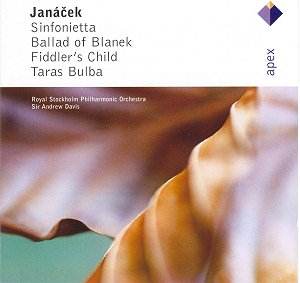A speedy demotion
to super-budget price here. Originally issued at full price late
in 1998 on Finlandia 3984-21449-2, Sir Andrew’s Janáček collection
is indeed a useful coupling: on paper, at least. The problem
seems to be that this Scandinavian/English combination is just
not close enough in spirit to the Czech heart of these works.
The Sinfonietta
is one of Janáček’s most popular works, of course, and there
are far more convincing readings available than this one:
try Rattle on EMI (coupled with the great Glagolitic Mass
on EMI Great Recordings of the Century CDM5 66980-2: see review)
or Mackerras (on Double Decca 448 255-2). In Davis’s hands, the
military-band inspired fanfares of the
first movement are robust, but are lacking in true grit. Certainly
things improve in the second movement, where Janáček’s characteristic
‘burbles’ take on a not inappropriate manic quality and the strings
cope as well as can be expected with their screamingly
high pyrotechnics. All five movements of the Sinfonietta
are depictions of aspects of Janáček’s adoptive home town,
Brno. The third, Moderato, is of the monastery there. Davis’ reading
is commendable in its aching, yearning opening and rhythmic awareness.
The fourth movement (the streets of Brno; or, if one is of an
older generation, afternoon TV’s ‘Crown Court’!) does not in this
account quite capture any atmosphere to speak of. A final movement
that gets up a good head of steam is not really enough to redeem
Davis’s conception, despite the low asking price.
It will be for the couplings, if anything, then,
that one would want to buy this release. And there is indeed much
rewarding material here. The Ballad of Blaník was
written when the composer was concerned with the Czech National
movement. Blaník is the resting place of St. Vaclav (Wenceslas)
and his knights, where they sleep, ready to be reawakened by their
people in direst need. Inspired by Czech independence after World
War I and a version of the legend by Jaroslav Vrchlicky, what
strikes one musically about this piece is its immediately more
blended orchestral palette (there is significantly less use of
juxtaposition than in the Sinfonietta, for example). It
is a thoroughly enjoyable, predominantly lyrical work with an
uplifting, invigorating end.
Fiddler’s Child
represents the full emergence of Janáček’s mature compositional
style. Short melodic units, clean orchestral textures make it
sound immediately more modern after Ballad of Blaník.
Its gestural world is extremely effective.
The ‘Slavonic rhapsody’, Taras Bulba,
inspired by Gogol’s story of the same name, is one of Janáček’s
masterpieces. Although Davis is better in the spectrally shifting
first part, ‘The Death of Andri’, the performance is let down
by the finale, ‘Prophesy and Death of Taras Bulba’. There is a
gloss on the emotions which highlights Davis’ superficiality.
Technically, the strings of the Royal Stockholm Philharmonic sound
ill at ease with Janáček’s high writing (and this composer
does like it up there!). If the Sinfonietta is not top
priority, maybe try Frantisek Jilek’s versions with the Brno State
Philharmonic Orchestra on Supraphon of the other works to get
closer to the spirit of this composer (SU1521-2).
Colin Clarke
